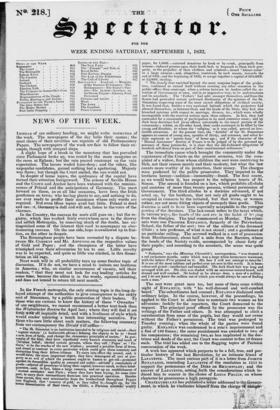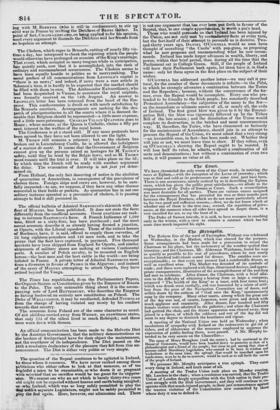- In the -.French metropolis, the only stirring topic is
the long-de- layed attempt of the authorities to 'give consequence to the sickly seat of Simonians, by a publio prosecution of their leaders. T6 'those Who are'cntious.Ao knew the history of ' these " Owenites " of our neighbours, - we Cannot recoreinend a better text-book than the' Weitininster: Reriiew for April last; where they will find it set "fortli:Witlealliequisite detail,- and with a liveliness of style which would render 'amusing...a inuelf lei interesting narratiVe... • For theseWho care little abent. Snell' matters, the following summary from our contemporary the .the, Herald .—suffice— "The *: is an institution intended to be religious and social—their ' orgliate statute' (a* fashionable phrase) defining the objects to be to found a neteform.of faith, and change the elementary principles of'society.? in put.: suariee-orthc-ffisc, they have. repudiated 'every known Ceremony and tenet of . Christian -belief; elected certain persons, whom they tall Popes or 'Fa- thers,' to be the oracles of the new wisdom,. assumed apeculiar form of dress, and aimed at 'contrast in every particular which could give them'notoriety and distinetion fro* their fellow-citizens. To. arryinto'effect the ' second, and, it
wouRi the' more important Object, they have 'denounced all sort of proL petty as an evil Of which the possessor ought to hasten to, rid—protested agaifistite descendible.qualitY as Unsocial and UnfaitHadiis'd'a coniniiinity of
goods—adjured all proselytes tO biing* their Capital; however small; to thèirhend- 9uart_anl, infect, taken a large . concern and set up an establishment of mutual assistance' near Paris ; where they been trying, for sometime .past, to earriirtheir extraordinary doctrines into practical operation. Besides these means, they sent missionaries from the brotherhood throngliont FranCe into England, that Country of gold,' as they called "it—boiight for-the .better dissemination. of their views, the Glae, a 'Parisian scietitifid-wealk
•
paper, for 1,8001.—extorted donations by hook or by crook, principally from women—induced persons upon their death-beds to bequeath to them their pro- perty, to the prejudice of their children and relations—issued labour-notes' to a large amount—and, altogether, contrived, by such means, towards the end of 18.31, and the beginning of 1842, to scrape together a capital of 300,0001. or 12,000/. sterling. • " The family thus enriched beyond the most sanguine hopes of the projec- tors, continued to extend itself without creating any other sensation in the public offices than contempt, when a schism between its leaders called the at- tention of Government at once, and in an imperative way, to its malversations and its mischiefs. The ' Fathers ' had split amongst themselves, and from the - fissure had protruded certain awkward disclosures of the opinions of the St. ; Simonians respecting some of the most sacred obligations of civilized society. It was found that, besides a very equivocal latitude which the projectors had allowed themselves, as between them and the heads of the State, they had also broached opinions with respect to marriage, divorce, Ike., which were wholly incompatible with the received notions neon these subjects. In fact, they had contended for a community of participation in its most extensive sense; and by their loose doctrines had given offence universally to the moral portion of the• community ; whilst, on the other hand, their ranks continued to be filled by the young and dissolute, to whom the ' religion,' as it was called, proved an irre- sistible attraction. At the present time, the faithful' of the St. Simonians appears to consist of young men, apostles of thirty, and actresses, and other fe- male aspirants to ascetic fame ' of lesser age; and if the character of the Mutual Assistance ' Society of France is to be judged of by the personal ap- pearance of these patriarchs, it is clear that the old-fashioned obligations of monkish self-denial form no part of their constitutional ordinances."
The immediate cause which brought the community under the cognizance of the Courts on the present occasion, was the com- plaint of a widow, from whose children the sect were contriving to filch, not their reason merely and their modesty, but what the law counts more worthy of its protection, their money. The charges were preferred by the public prosecutor. They imputed to the brethren heresy—sedition—immorality—fraud. The first count, as we would term it, has respect to the religious tenets of St. Simon. The second is founded on a law, which prohibits all clubs and societies of more than twenty persons, without permission of Government. The third alludes to a doctrine advanced, if not acted on, by the brethren, that not only all goods ought to be occupied in common by the initiated, but that wives, or women rather, are not more fitting objects of monopoly than goods. This doctrine is said to have been especially acceptable to the younger portion of the devotees. The last count refers to the taxes which, in various ways, the heads of the sect are in the habit of levying from the disciples. The trial commenced on Monday. The crimi- nals were one PROSPER ENFANTIN, formerly of the Polytechnic School, the father of the sect; two of the editors of the deceased Globe; a late professor, of what is not stated; and a gentleman of no particular calling. The accused walked in a sort of procession froni Menilmontant, about half a mile from the Barriers, *here the heads of the Society reside, accompanied by about forty of their pupils ; and according to the accounts, the scene was quite grand; " Enfantin," says the Morning Chronicle's correspondent, "was dressed in a red cachemere mantle, under which was a large white .kerseymere waistcoat, with the letters.Pe're printed on it. His face I will not 'attempt to describe! It is one of the most sublime and perfect, ever yet seen in this world. It is bene- volent aid grahd---intellectiial 'and beautiful.. His dark black hair-was long and arranged with art. His chin was shaded with an enormous natural beard, well dressed and well combed. He looked as he always does, a man of a million ; and I do not know the million out of which you would always be sure of finding such a man."
The rest were great men too, but none of them came within sight of ENFANTIN, with "his well-dressed and well-combed beard.". The subordinates had counsel ; ENFANTIN disdained such ordinary helps. Ili the course; however, of the proceedings, he applied to' he Court to allow him to nominate two women as his advocates: luckily for the reporters, the Court demurred to the request.: The principal proof offered by the prosecutor was the writings of the Father and others. It • was attempted to elicit a corroboration from some of the pupils, but they would not swear without the Father's permission. The trial - was prolonged to Tuesday evening; when the whole of the parties we're found guilty: _EgfArrrix we's condemned to a year's imprisonment and a fine of 100 francs; the same punishment was awarded to two of his companions; the remaining two; as less implicated in the doc trines and deeds Of the sect, the Court was content to fine 50 francs each : The trial has added one to the flagging topics' of Parisian conversation of the week. - .. • - • • •
A work has appeared which purports to be a full, true, and par- ticular:history • of the ,last Revolution, :by an intimate friend of
LAFAYETTE. The most curious part Of it is a letter from JOSEPH _ . -
,B014PARTE, reminding LAFAYETTE' of the resolution in 1815 to ,si..tppo_K the pretensions. of _the Puke DE REICHSTADT ; and the answer of •LAFAYErrE, .settindkortli the considerations' which in- duced him to concur, in the choice of Louis PHIL'IP, on whoSe
• . . • . .
character lie pronounces:a high:panegyric. CHATEAUBRIAND has - published a letter addressed to th,..Gove.rn- sment, in Which. he vindicates himself from the chargrtit - . - - ing with M. BERRYER (who is still in confinement). to stir up civil war in France by inviting the Date'less of BEaat thither. In point of fact, Cnantatuntrawn, on heing applied to for his opinion, used every argument te dissuade the Dateless and helftiends from so hopeless an attempt.



























